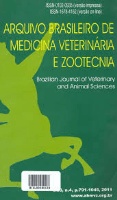
ARQUIVO BRASILEIRO DE MEDICINA VETERINARIA E ZOOTECNIA
Scope & Guideline
Bridging knowledge gaps in veterinary and animal sciences.
Introduction
Aims and Scopes
- Veterinary Clinical Research:
The journal publishes studies that investigate clinical practices, treatments, and outcomes for various animal species, including case reports and novel therapeutic approaches. - Animal Health and Disease Management:
Research on epidemiology, diagnosis, and management of diseases affecting livestock and companion animals is a core focus, aiming to improve animal welfare and productivity. - Zoonotic Diseases and Public Health:
Papers exploring the intersection of veterinary medicine and public health, particularly zoonotic diseases and their implications for human health, are prominently featured. - Animal Nutrition and Feed Science:
The journal addresses topics related to animal nutrition, including the formulation of diets, feed additives, and their effects on growth and production. - Breeding and Genetics:
Research on genetic selection, breeding techniques, and their impact on livestock productivity and health is a significant area, including studies on genetic parameters and traits. - Sustainable Practices in Animal Husbandry:
The journal promotes research on sustainable practices in animal production, environmental impacts, and innovations in animal husbandry.
Trending and Emerging
- Integrative and Holistic Approaches:
There is an increasing emphasis on integrative and holistic veterinary practices, including the use of alternative therapies and a focus on overall animal well-being. - Impact of Climate Change on Animal Production:
Research addressing the effects of climate change on animal health, productivity, and management practices is gaining traction, reflecting global concerns about sustainability. - Technological Innovations in Veterinary Medicine:
Papers exploring the use of technology in veterinary practices, including telemedicine, diagnostic tools, and data analytics, are emerging as important topics of interest. - Animal Welfare and Ethics:
A growing focus on animal welfare, ethical treatment, and the psychological aspects of animal care is evident, aligning with global movements towards humane treatment of animals. - Microbiome Research:
The exploration of the microbiome's role in animal health and nutrition is a rapidly growing area, with implications for disease prevention and management strategies.
Declining or Waning
- Traditional Practices in Animal Husbandry:
There seems to be a decreasing interest in studies focused solely on traditional or outdated animal husbandry practices, as the field shifts towards more innovative and sustainable approaches. - Basic Descriptive Studies:
Papers that primarily provide basic descriptive data without substantial analysis or application appear less frequently, indicating a shift towards more applied research. - Chemical and Synthetic Treatments:
Research focused on chemical interventions or synthetic treatments is waning, possibly due to growing concerns over chemical residues and a preference for more natural or holistic approaches.
Similar Journals
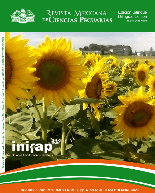
Revista Mexicana de Ciencias Pecuarias
Fostering Collaboration in Veterinary Medicine and ResearchRevista Mexicana de Ciencias Pecuarias, published by INIFAP-CENID PARASITOLOGIA VETERINARIA, is a prominent open-access journal since 2010 that caters to the fields of Animal Science and Veterinary Medicine. Based in Mexico, this journal addresses critical issues in animal health, production, and welfare, making it instrumental for researchers, professionals, and students seeking to advance their knowledge and practices. With an impact factor that reflects its growing influence, particularly in the Q3 quartile rankings in both Animal Science and Zoology as well as Veterinary (Miscellaneous) categories, the journal provides a vital platform for the dissemination of innovative research and findings. Additionally, its Scopus Ranks position highlights its role in publishing significant contributions to the fields of Veterinary Science and Agricultural Biology. The journal fosters a collaborative learning environment through its open-access model, ensuring that valuable insights are accessible to a wide audience. For those committed to enhancing animal well-being and advancing veterinary practices, the Revista Mexicana de Ciencias Pecuarias stands as a key resource through its rigorous peer-reviewed publication process and commitment to scientific excellence.

IRISH VETERINARY JOURNAL
Leading the way in veterinary discoveries and insights.IRISH VETERINARY JOURNAL is a premier open-access publication in the field of veterinary science, established to disseminate high-quality research and innovations that advance the veterinary profession and animal health. Published by BMC since 2004, this journal not only ensures worldwide access to cutting-edge findings but also maintains an impressive ranking as Q1 in the Veterinary (miscellaneous) category according to the 2023 metrics, highlighting its significance and influence. With an impressive Scopus rank of #19/194 and a 90th percentile placement, it provides a robust platform for researchers, professionals, and students alike to engage with the latest studies, reviews, and case reports. The journal's coverage spans from its inception in 1973 to the present, catering to a diverse audience interested in various aspects of veterinary science, ensuring that it remains an essential resource for those passionate about the welfare of animals and the advancement of veterinary practices.
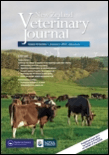
NEW ZEALAND VETERINARY JOURNAL
Driving excellence in veterinary research and education.NEW ZEALAND VETERINARY JOURNAL, published by Taylor & Francis Ltd, stands as a pivotal platform in the realm of veterinary science, contributing significantly to the global discourse on animal health and welfare since its inception in 1952. With an ISSN of 0048-0169 and an E-ISSN of 1176-0710, this journal offers invaluable insights within both the veterinary and general medical fields, currently achieving a commendable Q2 ranking in Veterinary (miscellaneous) and Q3 in Medicine (miscellaneous) for 2023. Its Scopus ranking places it in the 76th percentile among veterinary journals, affirming its high-impact presence in academia. While access to this journal is not open, it maintains an essential role for researchers, professionals, and students aiming to advance their knowledge and contribute to the field of veterinary science. With a commitment to disseminating quality research, NEW ZEALAND VETERINARY JOURNAL enriches the understanding of veterinary practices and enhances ongoing dialogue on critical health issues affecting animals, promoting better outcomes through scientific inquiry.

REVISTA CIENTIFICA-FACULTAD DE CIENCIAS VETERINARIAS
Fostering innovation in veterinary and agricultural research.REVISTA CIENTIFICA-FACULTAD DE CIENCIAS VETERINARIAS, published by the Universidad del Zulia, is a prominent open-access journal dedicated to advancing the fields of veterinary science, animal science, and food science. Since its inception in 1997, the journal has served as a vital platform for disseminating quality research and fostering academic dialogue among professionals and scholars in the veterinary and agricultural sectors. With its commitment to open access since 2010, the journal aims to make valuable research freely accessible to a global audience, thereby contributing to the advancement of scientific knowledge. Although currently categorized in the bottom quartile of various fields—including Animal Science and Zoology, Food Science, and Immunology—REVISTA CIENTIFICA-FACULTAD DE CIENCIAS VETERINARIAS is dedicated to nurturing innovative research that addresses pressing challenges in veterinary and related sciences. Researchers, professionals, and students will find this journal to be an important resource for quality studies that have implications for animal health, food safety, and biotechnology in the context of Venezuelan and international landscapes.

Abanico Veterinario
Empowering the Veterinary Community Through ResearchAbanico Veterinario is a prominent academic journal dedicated to the field of veterinary science, published by Sergio Martinez Gonzalez. With its ISSN 2007-4204 and E-ISSN 2448-6132, this journal serves as a vital resource for researchers, practitioners, and students interested in the latest advancements and research in veterinary medicine. Although Abanico Veterinario operates on a non-open access model, it provides insightful content that addresses a diverse range of topics such as animal health, veterinary ethics, and innovative practices. The journal aims to promote knowledge sharing and foster collaboration within the veterinary community, ultimately contributing to improved animal care and welfare. With a commitment to excellence and a growing reputation within the field, Abanico Veterinario stands as an essential platform for those seeking to enhance their professional skills and stay abreast of emerging trends in veterinary science.
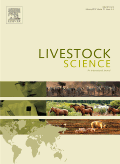
Livestock Science
Elevating Veterinary Practices through Open Access InsightsLivestock Science is a prestigious academic journal published by ELSEVIER, dedicated to the comprehensive study of animal science and veterinary medicine. With an esteemed Q1 ranking in both the fields of Animal Science and Zoology, as well as Veterinary (miscellaneous) in 2023, this journal is recognized for its impactful contributions to the understanding of livestock health, production, and management. The journal has consistently earned its high position within Scopus, ranking 26th out of 194 in General Veterinary and 86th out of 490 in Animal Science and Zoology, reflecting its significant influence within the research community. The open access policy allows for broader dissemination of knowledge, promoting collaboration among researchers, professionals, and students alike. With its continuous publication cycle from 2006 to 2024, Livestock Science remains an essential resource for anyone interested in the advancements, challenges, and innovations within the field of livestock management and veterinary practices.

Acta Veterinaria Eurasia
Transforming veterinary science through innovative research.Acta Veterinaria Eurasia is a prominent open access journal dedicated to advancing the field of veterinary sciences. Published by AVES since 2002, it aims to provide a platform for innovative research and insights that enhance veterinary practices and animal welfare. With its ISSN 2618-639X and E-ISSN 2619-905X, the journal has established a growing international reputation, particularly in Turkey, and is indexed in major databases. As of 2023, it is positioned in Q4 of the Veterinary (miscellaneous) category and holds a Scopus rank of #138 out of 194 in the general veterinary domain, placing it in the 29th percentile. The journal spans a broad scope within veterinary studies, inviting contributions that foster knowledge dissemination and collaboration among researchers, professionals, and students alike. By promoting open access since its inception, Acta Veterinaria Eurasia is committed to making cutting-edge research accessible to all, ultimately supporting improved health outcomes in veterinary practice.

Italian Journal of Animal Science
Fostering excellence in animal science scholarship.Italian Journal of Animal Science (ISSN: 1594-4077; E-ISSN: 1828-051X), published by Taylor & Francis Ltd, serves as a pivotal platform for the dissemination of cutting-edge research in the fields of animal science and zoology. Since its transition to Open Access in 2002, it has broadened its reach, allowing researchers from around the globe to share their findings and engage in critical dialogue. With its esteemed Q1 ranking in the 2023 category of Animal Science and Zoology and a notable position in the Scopus rankings—ranked 65 out of 490—this journal is a leader in driving the advancement of knowledge in animal science. The Italian Journal of Animal Science aims to publish original research articles, reviews, and methodological papers that contribute to the understanding of animal biology, welfare, nutrition, and conservation, making it a vital resource for researchers, professionals, and students dedicated to advancing the field. Based in the United Kingdom, and with a commitment to excellence, the journal is poised to continue fostering scholarly communication through 2024 and beyond.

BERLINER UND MUNCHENER TIERARZTLICHE WOCHENSCHRIFT
Advancing Veterinary Knowledge Since 1946BERLINER UND MUNCHENER TIERARZTLICHE WOCHENSCHRIFT is an esteemed journal in the fields of Veterinary Science and Medicine, published by SCHLUETERSCHE VERLAGSGESELLSCHAFT MBH & CO KG. Since its inception in 1946, this journal has served as a vital platform for advancing knowledge and research in veterinary medicine within Germany and beyond. With a current impact factor that places it in the Q4 category in both Medicine and Veterinary, it continues to provide significant insights for professionals, researchers, and students engaged in the veterinary community. Although it is not an Open Access journal, its rich content contributes to the foundational literature of the field, making it an essential reference. Researchers looking to publish their findings or keep informed on the latest advancements in veterinary and medical practices will find this journal an invaluable resource. It is headquartered in Hannover, Germany, and serves as a testament to the ongoing dedication to veterinary research since the mid-20th century.
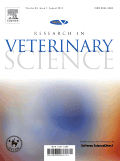
RESEARCH IN VETERINARY SCIENCE
Exploring the Frontiers of Animal Health ScienceRESEARCH IN VETERINARY SCIENCE, published by Elsevier Science Ltd, stands as an authoritative platform in the field of veterinary studies. With its origins dating back to 1965, this prestigious journal is recognized for its contribution to the advancement of veterinary knowledge and practices, boasting a remarkable Q1 categorization in Veterinary (miscellaneous) and ranking 24th out of 194 in the Scopus veterinary general category, placing it in the top 13% of its field. The journal presents a diverse range of research articles that explore critical topics in veterinary science, thereby facilitating evidence-based practices and innovations. Although currently not an open-access journal, it remains highly accessible through institutional and personal subscriptions, allowing researchers, professionals, and students to benefit from its rich collection of studies. As it moves toward 2024, RESEARCH IN VETERINARY SCIENCE continues to be a vital resource for those dedicated to improving animal health and advancing veterinary science.